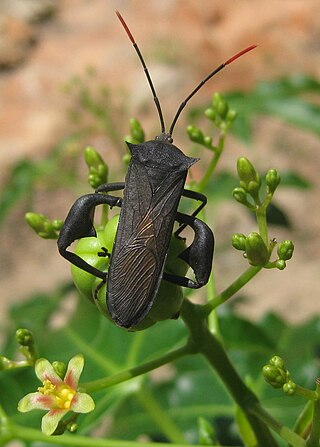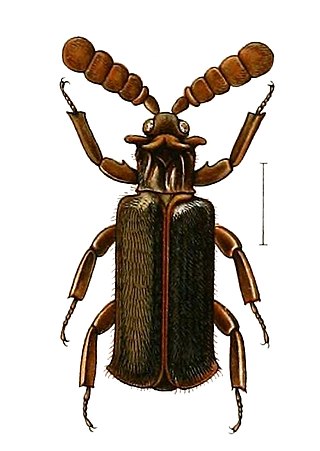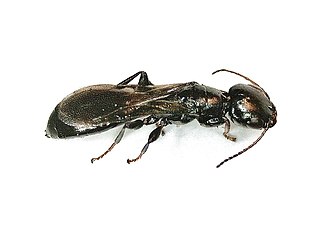
John Obadiah Westwood was an English entomologist and archaeologist also noted for his artistic talents. He published several illustrated works on insects and antiquities. He was among the first entomologists with an academic position at Oxford University. He was a natural theologian, staunchly anti-Darwinian, and sometimes adopted a quinarian viewpoint. Although he never travelled widely, he described species from around the world on the basis of specimens, especially of the larger, curious, and colourful species, obtained by naturalists and collectors in England.

Coreidae is a large family of predominantly sap-sucking insects in the Hemipteran suborder Heteroptera. The name "Coreidae" derives from the genus Coreus, which derives from the Ancient Greek κόρις (kóris) meaning bedbug.

Flower chafers are a group of scarab beetles comprising the subfamily Cetoniinae. Many species are diurnal and visit flowers for pollen and nectar, or to browse on the petals. Some species also feed on fruit. The group is also called fruit and flower chafers, flower beetles and flower scarabs. There are around 4,000 species, many of them still undescribed.

Erich Wasmann was an Austrian Jesuit priest and entomologist, specializing in ants and termites. He described the phenomenon known as Wasmannian mimicry and became a prominent Catholic popularizer of science, grounded in Christian beliefs, around 1900.

The Harpactorinae are a large subfamily of the Reduviidae. About 300 genera and 2,000 species worldwide have been described. Some of the species of the genera Zelus, Pselliopus, Sinea, and Apiomerus are of interest as biological pest control agents.
Edward Luther Kessel was an American biologist known for his work as an entomologist and writings to reconcile science and religion.

Arthropterus is a genus in the beetle family Carabidae. There are more than 60 described species in Arthropterus, found in Australia.

Cerapterus is a genus in the beetle family Carabidae. There are more than 30 described species in Cerapterus.

Heteropaussus is a genus in the beetle family Carabidae. There are more than 20 described species in Heteropaussus.

Pentaplatarthrus is a genus of in the beetle family Carabidae. There are about eight described species in Pentaplatarthrus, found in Africa. These are ant nest beetles and are obligate myrmecophiles, predatory on ant larvae and workers.

The Bethylidae are a family of aculeate wasps in the superfamily Chrysidoidea. As a family, their biology ranges between parasitoid wasps and hunting wasps.

Paussini is a tribe of ground beetles in the family Carabidae. There are more than 25 genera and 610 described species in Paussini. They are found mainly in Africa, southern Asia, and the Pacific, although the genus Homopterus is found in the Americas.

The Aleocharinae are one of the largest subfamilies of rove beetles, containing over 12,000 species. Previously subject to large-scale debate whether the subfamily deserved the familial status, it is now considered one of the largest subfamilies of rove beetles.

Lomechusini is a tribe of rove beetles. It is generally small, but includes some fairly large genera such as Zyras.

Entedoninae is a subfamily of wasps in the family Eulophidae. The subfamily includes over 90 genera.

Eulophinae is a subfamily of wasps in the family Eulophidae which includes over 90 genera.

Cremastocheilini is a tribe of scarab beetles in the family Scarabaeidae. There are about 50 genera in the tribe Cremastocheilini.

Aphelocheirus is a genus of true bugs belonging to the family Aphelocheiridae.
















